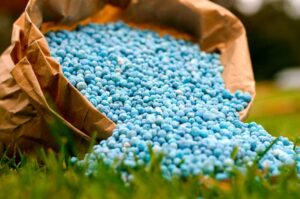
The possibilities for increasing exports of Ukrainian mineral fertilizers and controlling their imports, in particular preventing the import of fertilizers from the aggressor country through other countries, were discussed by the Minister of Agrarian Policy and Food of Ukraine, Vitaliy Koval, at a working meeting with representatives of domestic mineral fertilizer producers at the ministry, according to a press release on the ministry’s website.
“This meeting was supposed to answer the question of how to increase exports of Ukrainian fertilizers to Africa, Asia, and further to the EU. Representatives of Ostchem (the largest producer of nitrogen fertilizers) and the Union of Chemists of Ukraine were unanimous at this meeting: imports remain the key problem,” said Oleg Arestarkhov, director of corporate communications at Group DF, to the Interfax-Ukraine news agency.
According to him, it is imports that prevent Ukrainian companies from expanding production and increasing exports, primarily imports from countries of the former Soviet Union, which have a single market with Russia: Kazakhstan, Uzbekistan, Turkmenistan, and Azerbaijan, which account for almost half (300,000 tons) of all nitrogen fertilizer imports.
“They have access to cheap gas, so they can dump prices. Total imports of nitrogen fertilizers in the first four months of 2025 amounted to 1.2 million tons, of which 689,300 tons were nitrogen fertilizers. For comparison, Ukrainian production for the four months will be about 500,000 tons,” Arestarkhov said.
He added that Ukraine is losing the urea market, and a new trend is that China has begun to actively supply low-quality cheap ammonium sulfate.
According to the Ostchem representative, due to growing imports, Ukrainian enterprises are operating at the break-even point, which is holding back capital investment in industrial sites and forcing them to lay off workers.
An additional problem for Ukrainian producers is Russian shelling, after which Ostchem had to shut down its workshops several times in the first quarter due to damage to the external gas and energy infrastructure.
“It is logical that we are waiting for support from the government. We spoke openly about this at the meeting and provided them with all the statistics. The dominance of imports is one of the reasons for the decline in the industry. This is also the reason why Dniproazot and the state-owned Odesa Port Plant cannot start production. If the government lends a helping hand, it will see an increase in exports,” Oleksiy Golubov, president of the Ukrainian Chemists’ Union, told the Interfax-Ukraine news agency.
In turn, Minister Koval emphasized the instructions of Ukrainian President Volodymyr Zelenskyy to expand the geography of exports, in particular to the Middle East and Africa, as well as to open a mineral fertilizer hub in South Africa and develop trade between the two countries.
“Ukraine has all the prerequisites for mineral fertilizers to become not only a means of strengthening food security within the country, but also a strategic export commodity,” said the head of the Ministry of Agrarian Policy.
According to the press release, representatives of investment companies, including umgi, also participated in the meeting.
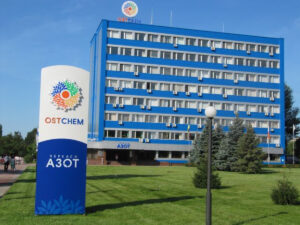
In January-March 2025, the nitrogen holding Ostchem produced 529.3 thousand tons of mineral fertilizers, which is 26.5 thousand tons, or 5.3% more than in the same period of 2023.
“The production structure changed in line with demand and imports: the share of ammonium nitrate and urea decreased, while the share of the most popular type of fertilizer, UAN (urea ammonium nitrate), increased,” the holding said in a statement on Thursday.
Ammonia nitrate production in the first quarter of 2025 decreased to 226,500 tons from 246,000 tons last year, urea to 116,700 tons from 123,500 tons, while UAN production increased from 123,800 to 162.2 thousand tons, and VAS (lime-ammonium nitrate, which is produced only at Rivneazot) – to 15.8 thousand tons from 10.8 thousand tons.
In total, Cherkasy Azot produced 394.8 thousand tons of products, and Rivneazot produced 134.4 thousand tons.
“Ostchem enterprises faced forced production stoppages due to drones entering the territory of our plants and the destruction of external gas and energy infrastructure in the Cherkasy and Rivne regions. Force majeure led to forced disruptions in fertilizer supplies, so we apologize to our customers,” the release said, citing Group DF’s head of corporate communications, Oleg Arestarkhov.
According to him, this was the most difficult season because the holding suffered huge losses due to emergency shutdowns and restarts of production facilities, but he confirmed that fertilizer orders would be fulfilled.
He also thanked the staff of the State Emergency Service of Ukraine for their help in extinguishing the fires, as well as others involved in restoring the destroyed energy and gas infrastructure.
The release also notes that the Ostchem nitrogen holding company revised its strategy in 2025: the new priority is to reduce production risks through investments in the energy independence of enterprises.
“With rising electricity prices and continuing risks, the nitrogen business is forced to take steps to ensure the stability of production chains and reduce external energy consumption,” the holding company explains.
Ostchem is Dmitry Firtash’s Group DF nitrogen holding company, which brings together the largest mineral fertilizer producers in Ukraine. Since 2011, it has included Rivneazot and Cherkasy Azot, as well as Severodonetsk Azot and Stirol, which are not operating and are located in the occupied territories.
Cherkasy Azot (Cherkasy, Ukraine) is one of Ukraine’s largest chemical companies. Its designed production capacity is 962,700 tons of ammonia per year, 970,000 tons of ammonium nitrate per year, 891,600 tons of urea per year, and 1 million tons of UAN per year.
PJSC Rivneazot is one of the largest chemical companies in Western Ukraine. On April 12, 2024, Group DF and South Korea’s Hyundai Engineering signed an agreement to build a chemical hub in Rivne. The project involves the construction of plants for the production of green ammonia and hydrogen based on renewable energy sources, as well as new enterprises and production sites for the production of nitrogen fertilizers and chemical derivatives.
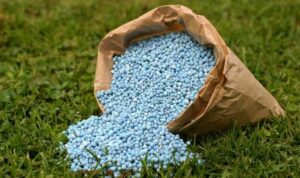
The plants of nitrogen holding Ostchem produced 1.8 million tons of mineral fertilizers in 2024, down 13% from 2023, according to a press release from Group DF International’s corporate communications department.
According to the report, Cherkasy-based Azot maintained its production level at 1.4 million tons in 2024, while Rivne Azot reduced its output by 22% and produced 407 thousand tons, down from 528 thousand tons a year earlier.
According to Group DF International, the key products produced by Ostchem’s plants were ammonium nitrate – 760.2 thousand tons (41.9% of the total), UAN – 506.7 thousand tons (27.9%), urea – 401.9 thousand tons (22.2%), and ammonia – 75 thousand tons (4.1%).
The reasons for the decline in production were low grain prices on global markets, power outages, the ongoing war and imports of cheap, low-quality fertilizers.
“Ukrainian farmers are going through difficult times, and the margins of their businesses have fallen significantly. This affects the domestic demand for mineral fertilizers – sometimes priority was given to cheaper fertilizers of dubious quality, which were imported en masse last year. We play the long game, and even in the most difficult times we ensure high international quality of our products and 100% fulfillment of our obligations. Even during the periods of forced shutdowns of Rivne Azot due to power outages, these business values remained unchanged, as Ukrainian farmers could see,” said Sergiy Pavlyuchuk, Chief Operating Officer of Ostchem’s nitrogen business.
The holding reported that in 2024, the average annual capacity utilization of Ostchem did not exceed 70%. Uncontrolled imports did not allow Ukrainian enterprises to operate at full capacity.
“Unfortunately, we were forced to cut staff and optimize costs. According to my estimates, the decline in the chemical industry was about 10%, and this is the result of growing imports and ineffective industrial policy,” Pavliuchuk said.
He added that in 2025, Ostchem has adapted to the military business environment and will continue to focus on developing new industrial sites, energy efficiency, ensuring stable operations and improving product quality in the new environment.
“The key objective for 2025 is to ensure production sustainability in the current unstable energy supply environment, reduce production risks, and replace imports with better quality. Our long-term strategic priority remains the same: import substitution and, consequently, an increase in market share. We will continue to invest in the production of the most popular fertilizers and expand our product line. First of all, we are talking about investment projects related to the launch of urea and industrial gases production,” summarized Pavliuchuk.
Ostchem is a nitrogen holding of Dmitry Firtash’s Group DF that unites the largest mineral fertilizer producers in Ukraine. Since 2011, it has included Rivne Azot and Cherkasy Azot, as well as Sievierodonetsk Azot and Stirol, which are out of operation and located in the occupied territories.
Cherkasy Azot PrJSC (Cherkasy, Ukraine) is one of the largest Ukrainian chemical enterprises. The design production capacity is 962.7 thousand tons per year of ammonia, 970 thousand tons per year of ammonium nitrate, 891.6 thousand tons of urea, and 1 million tons per year of UAN.
Rivne Azot is one of the largest Ukrainian chemical companies in Western Ukraine. On April 12, 2024, Group DF and South Korean Hyundai Engineering signed an agreement to build a chemical hub in Rivne. The project envisages the construction of green ammonia and hydrogen plants based on renewable energy sources; new enterprises and production sites for nitrogen fertilizers and chemical derivatives.
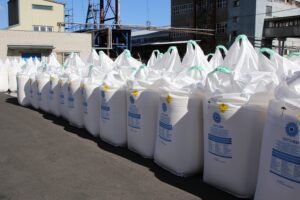
The plants of nitrogen holding Ostchem produced 520.6 thousand tons of mineral fertilizers in the first quarter of 2024, which is only 1% more than in the first quarter of 2023 (515.5 thousand tons), the holding said in a statement on Wednesday.
“The growth in production of the Ukrainian chemical industry has stopped due to the uncontrolled growth in fertilizer imports from Poland, as well as Russia-friendly Azerbaijan and Turkmenistan,” the company said.
According to the company, in the first quarter of 2024, fertilizer imports increased by 35% to 701.2 thousand tons.
It is specified that Cherkasy Azot produced 404.3 thousand tons in January-March this year, while Rivne Azot produced 128 thousand tons of fertilizers.
According to the report, the production structure remains fairly stable: ammonium nitrate is the leader (246 thousand tons produced), followed by urea-ammonium nitrate (UAN) (123.8 thousand tons) and urea (123.5 thousand tons). Production of limestone-ammonium nitrate (LAM) increased slightly year-on-year to 15.8 thousand tons, and ammonia to 9.08 thousand tons.
Ostchem noted that it met its obligations in full during the spring sowing season, but in 2024 the negative industry trend intensified, with fertilizer imports significantly exceeding domestic production.
“In the first quarter of 2024, imports amounted to 701.2 thsd tonnes, exceeding domestic production by 35%. Imports continue to kill domestic production: four fertilizer producers have already been shut down – OPP, Dniproazot, Rivneazot and Sumykhimprom,” commented Oleg Arestarkhov, Head of Corporate Communications at Group DF.
It is noted that Ukrainian producers continue to lose ground in the Ukrainian market in most fertilizer segments, except for UAN.
“First of all, Ukrainian chemical plants are dramatically losing the urea market: in the first quarter, Ukraine produced 123.5 thousand tons of urea, while imports amounted to 181 thousand tons. 88% of all imported urea came from Azerbaijan and Turkmenistan, countries friendly to Russia,” Arestarkhov added.
According to him, Poland is also strengthening its position as the largest importer of fertilizers to Ukraine, as it is currently flooded with cheap Russian and Belarusian fertilizers that are not subject to EU sanctions, which is why all the excess fertilizers from the Polish market are being redirected to Ukraine.
According to Ostchem, in 2023, Poland imported 1.016 million tons of urea, of which urea from Russia accounted for 34% (345 thousand tons). At the same time, in the first quarter of 2024, Poland has already become the undisputed leader among importers of such fertilizers as ammonium nitrate (52 thousand tons out of 109.7 thousand tons of total imports), ammonium sulfate nitrate (7.9 thousand tons out of 9.4 thousand tons), UAN (17.4 thousand tons), and NPK (63.2 thousand tons out of 144.3 thousand tons) in the Ukrainian market.
In the first quarter, Ukraine imported 121.9 thousand tons of sulphate (China is the leader with 75.3 thousand tons) and 74.6 thousand tons of superphosphate (Bulgaria – 37.3 thousand tons and Greece – 27.4 thousand tons),
“Unfortunately, behind the loud slogans of Ukrainian government officials within the Buy Ukrainian campaign, there are no practical steps to reduce imports and protect the Ukrainian fertilizer producer,” Arestarkhov emphasized, recalling the specific proposals of the Ukrainian Chemists Union to protect the domestic market that were submitted to the government.
Ostchem is the nitrogen holding of Dmitry Firtash’s Group DF, which unites the largest mineral fertilizer producers in Ukraine. Since 2011, it has included Rivne Azot and Cherkasy Azot, as well as Severodonetsk Azot and Stirol, which are out of operation and located in the occupied territories.
Cherkasy Azot PrJSC (Cherkasy, Ukraine) is one of the largest Ukrainian chemical companies. Its design production capacity is 962.7 thousand tons per year of ammonia, 970 thousand tons per year of ammonium nitrate, 891.6 thousand tons of urea, and 1 million tons per year of UAN.
Rivne Azot is one of the largest Ukrainian chemical companies in Western Ukraine. On April 12, 2024, Group DF and South Korean Hyundai Engineering signed an agreement to build a chemical hub in Rivne. The project envisages the construction of green ammonia and hydrogen plants based on renewable energy sources; new enterprises and production sites for nitrogen fertilizers and chemical derivatives.
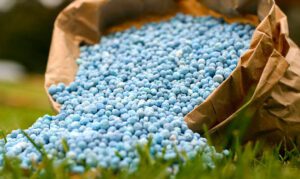
Ukrainian fertilizer market in 2022 will sag by about 40-55% – from 4.75 million tons to 2-2.9 million tons: it hit its bottom in early summer and began a rapid recovery, Oleg Arestarhov, director for corporate communications at Group DF, wrote in a column for Interfax-Ukraine.
According to him, in 2022 the revenue of farmers and solvent demand for fertilizers has decreased significantly. The main reasons were the increase of selling prices for fertilizers due to high gas prices, the reduction of cultivated areas by 14-16% because of the war and land mines, the direct losses associated with the destruction of warehouses, the withdrawal of the occupants of grain and stealing their agricultural equipment, as well as export restrictions on sales.
According to the representative of Group DF – the largest producer of nitrogen fertilizers in Ukraine, the consumption market of ammonium nitrate, although the decline from 1.8 million tons to 600 thousand – 1 million tons, this fertilizer is still the biggest demand in the country.
Arestarhov noted that a very large decrease in consumption – almost twice – is expected for complex fertilizers because of the significant shortage of phosphorus and potassium. This is associated with the blocking of fertilizer supplies from Belarus and the closure of maritime shipping.
The specialist estimates a drop in consumption of ammonium sulphate to 210-250 thousand tons from 490 thousand tons last year, UAN (carbamide ammonium nitrate) – to 400-600 thousand tons from 1.3 million tons, carbamide – to 330-410 thousand tons from 1.12 million, NPK, DAP – to 620-660 thousand tons.
He specified that an important new global trend, affecting the structure of fertilizer consumption in the world market – is a significant drop in urea prices in the second half of the year, which reduces the attractiveness of ammonium nitrate, which has a lower concentration of nitrogen. According to Mr. Arestarhov, according to some reports, the port of Constanta (Romania) currently has accumulated about 120 thousand tons of urea from all over the world, effectively making it a new European hub, where traders buy urea at the most reasonable price, without reference to a specific producer. However, Ukraine has not been affected by this trend so far: having obvious logistical advantages and rather acceptable domestic prices for gas, Ukrainian producers have preserved urea production and offer it to Ukrainian consumers at a competitive price.
As to forecasts Arestarhov paid attention to the change in the structure of consumption of mineral fertilizers by farmers: in 2023, oilseeds and soybeans may gradually replace cereals, which showed not the best profitability, while the determining factor for the structure of crops are the prices for grain and oil on world markets.
A Group DF representative pointed out that two plants of the Ostchem holding, Cherkasy Azot and Rivneazot, continued operating under war conditions, while Odessa Port Plant and Dniprozot have temporarily pulled out. Production was concentrated on the production of ammonium nitrate, UAN, IAS (lime ammonium nitrate) and compound fertilizers.
According to Mr. Arestarhov, UAN produced at Rivneazot was the most successful export product: 170.6 thousand tons of UAN were exported during 11 months, and the main buyers were European agrarians/traders from Romania, Hungary, Slovakia, Poland and Moldova.
Urea was exported 64.8 thousand tons, UAN – 29.6 thousand tons, ammonium nitrate and ammonia – only 11 thousand and 2.3 thousand tons, respectively. According to the expert, the reasons for the sharp decrease in exports are the priority to supply Ukrainian farmers and the logistical and administrative constraints on exports. Ukrainian fertilizer producers got a logistical advantage over fertilizer importers, as they are physically closer to customers, he added.
“2023 was, to put it mildly, very disappointing for importers: half a year there was almost no import of fertilizers to Ukraine, and now the number of imported fertilizer corridors across the entire spectrum of products has decreased significantly and has not recovered Among the imported fertilizers, which are still gradually imported – ammonium nitrate, UAN, urea. But the war will continue to block most imports,” stated Arestarhov.
Among other features 2022 on the Ukrainian fertilizer market, he called the active introduction of grain exchange schemes due to the lack of farmers working capital needed for the sowing season 2023.
According to the representative of Group DF, there is a significant pent-up demand for fertilizers on the market and great potential for growth in January-February 2023, which can be additionally assisted by the state’s help in concessional lending.
“In fact, the fall campaign-2022 was held on old stocks that remained in storage since the spring. The market heated up only in late fall – early winter – the active buying of fertilizers and the formation of the necessary reserves for the spring of 2023 began,” he wrote. The expert added that demand was fueled by price cuts by domestic producers, primarily for ammonium nitrate and UAN, in anticipation of a significant increase in sales.
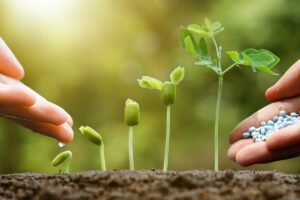
After Canada cancels import duties on Ukrainian goods for a year, Canadian potash fertilizers may become the main ones in the Ukrainian market and thereby replace Belarusian ones, which have not been imported to Ukraine since the beginning of Russia’s armed aggression.
The possible role of Canada in the Ukrainian market of potash fertilizers was reported by the Ukrainian Agribusiness Club (UCAB) on Facebook on Thursday.
The report states that Canada is the world’s largest producer and exporter of potash fertilizers. This country produces about 12 million tonnes of such fertilizers, thus occupying 24% of world production. At the same time, in 2021, Ukraine imported 287,500 tonnes of potash fertilizers, of which 69% came from Belarus, while its own production in the country is practically not developed.
“Therefore, Ukrainian farmers need to look for alternative suppliers, and Canada may become one of them. The abolition of import duties may become an additional factor, as it will increase the competitiveness of Ukrainian agricultural products in the Canadian market. Ukraine will be able to purchase potash fertilizers in Canada, in turn, sending its agricultural products, which are in abundance in the Ukrainian market, by the same transport,” the association said in the statement.
Canada imported 2.8 million tonnes of corn, 1.2 million tonnes of sunflower meal, and 0.5 million tonnes of soybeans in 2021, according to UCAB. It is these positions that Ukraine can supply to the Canadian market through the seaports of the Baltic countries.
The association recalled that before aggression of the Russian Federation, Ukraine had insignificant volumes of export deliveries of agricultural products to Canada, which was due not only to the significant territorial remoteness of this country, but also to the rather high development of the Canadian agro-industrial complex. Thus, during 2021, agricultural products worth $29.3 million were delivered to Canada, of which 49% of export revenue was formed by apple juice, 18% by sunflower oil and 11% by soybeans.
However, with the beginning of military aggression of the Russian Federation with the assistance of Belarus and the blockade of Ukrainian seaports by Russian warships, a number of countries canceled import duties on Ukrainian goods to help the Ukrainian economy. These factors may have an impact on Ukrainian foreign economic activity, including the increase in trade between Ukraine and Canada.
As reported, Canada, following the UK and the EU, would cancel all duties on imports of goods from Ukraine, Canadian Prime Minister Justin Trudeau announced on May 8 after meeting with President Volodymyr Zelensky in Kyiv.